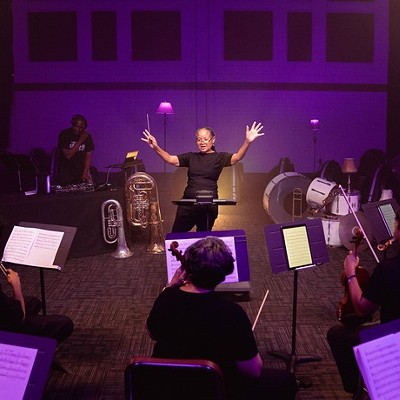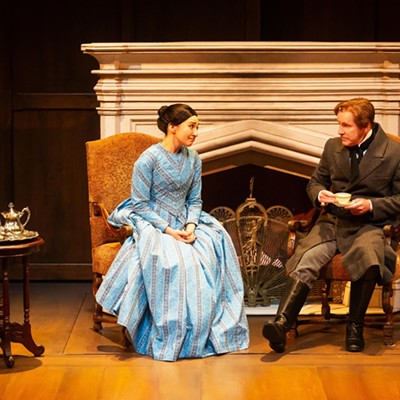"I think things splintered off about two years ago and just exploded. You have a bunch of little groups trying to get into bigger things, and it doesn't seem to work. Or it hasn't worked yet, anyway," she says. "Vachmiel has been talking about trying to bring everybody back together whether they like each other or not. That seems to be our biggest thing, is that even though we're outsiders and we stick together closely, we have a lot of infighting."
Gregorius says that such unrest is common in other groups with structures similar to Houston's vampire community. "A Wiccan from London once explained that there is a witch war every week and that most people can't stand each other. I think that is quite common when you have a lot of people who want to be leaders and few people who want to follow."
Phlamé has her doubts about whether people who identify as vampires could ever be viewed by outsiders as socially acceptable. "Would we ever fit in? I can get really discriminated against. It depends where I go and how I look when I do it. I usually don't share that part of myself with people unless I'm at a special event or something. As far as it being accepted? I don't know, with all the 50 Shades of Grey crap coming out and it being cool, but I don't think we're ever going to be really accepted. That's just not the way people work; that's not human nature. I'm fine with that."
When they encounter people who live a lifestyle modeled at least partially on an iconic monster, it's natural for some people to wonder if those others are dangerous. The heady mix of sex and energy feeding that many vampires indulge in, along with the decidedly dark image some of them cultivate, might worry people. When asked whether the Houston Police Department considered the vampire community a threat, an HPD spokesperson said no, it's not considered a problem.
Gregorius doesn't find that surprising. "So far, there is nothing to indicate that real vampires are any more dangerous than any other spiritual or subculture group."
Local vampires uniformly seem to endorse a code of ethics according to which their activities involve only people who've granted consent. They're not lurking in the shadows waiting to attack random passersby.
As in any community, there are disagreements within groups. That occasionally causes conflicts, but at least in Houston, there has never been any violence. "Sometimes vampires can be so contentious, and like any other subculture, there is vying for power and money, so there's a lot of infighting and internal warfare," Vachmiel says. "Anyone who tries to become a leader automatically becomes a target, but that's just a natural part of human nature."
Considering that the lives of real vampires differ so greatly from those of their mythical counterparts, people outside of that community might wonder why so many of them still choose to cultivate a personal image so heavily influenced by pop-cultural depictions of the movie monsters. Asking if the image of the fictional monsters is harmful or beneficial to real vampires elicits mixed responses. Tarik laughs as he says, "There's been a lot of misrepresentation. Twilight. Oh my God, why did that ever happen? Why did Twilight have to happen?"
"A lot of times people think vampires are like they are in movies, and that can hurt us. Twilight really hurt us. Looking pretty and graceful is nice and all, but we don't sparkle and we don't live in a soap opera, at least hopefully."
Aramond agrees that outsiders have misconceptions about real vampires that are harmful to his community: "Honestly, it hurts us. If you look at the actual subculture and then you look at the pop-culture version, the subculture is grounded in reality and scientific fact, and then you have the pop culture, and it's grounded in mythology and is a complete fantasy. When you bleed the two together, you sometimes get the crazies."
Lolanthe says, "It's like a dog chasing after a car; he wouldn't know what to do with it if it caught it. Certain people wouldn't know what to do with a real-life vampire when they actually meet one."
Aramond sums up the situation with a reality check. "I'm sorry, I don't turn into a bat, I don't sparkle, I don't disintegrate in sunlight, and if you stake me in the heart, that would kill anybody."
Despite their resistance to common folkloric clichés, many vampires use parts of the mythology, choosing to wear realistic artificial fang caps, for instance, or dressing in clothing reminiscent of their movie counterparts.
According to Gregorius, the image of the fictional monsters appeals because "there are several factors that make the vampire image appealing. The lure of immortality, the sexuality of it, the sort of aristocratic vibe many modern versions portray, and also the danger within it."
Vachmiel echoes that. "It's a form of empowerment. If we can pretend to be immortal, we can put the burdens of life aside for a while. It allows people to escape, and for some it's self-expression. It's an artistic way of saying, 'Here is my pain.' Every human being wants to be looked at and with some vampires, it's a way of saying, 'Look at me. See me. Acknowledge me. This is who I choose to be.'
"The vampire lifestyle, I know a lot of real vampires hate it; I don't. It's like sports fans painting themselves to go to the big game. It is that moment of emotional honesty where they say, 'I don't give a damn about being judged. This is who I choose to be, shaped by my own will.'"





